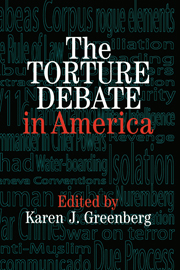Book contents
- Frontmatter
- Contents
- Acknowledgments
- List of Contributors
- Introduction: The Rule of Law Finds Its Golem: Judicial Torture Then and Now
- THE ISSUES
- ESSAYS
- Section One: Democracy, Terror and Torture
- Section Two: On the Matter of Failed States, The Geneva Conventions, and International Law
- Section Three: On Torture
- 13 Legal Ethics and Other Perspectives
- 14 Legal Ethics: A Debate
- 15 The Lawyers Know Sin: Complicity in Torture
- 16 Renouncing Torture
- 17 Reconciling Torture with Democracy
- 18 Great Nations and Torture
- Section Four: Looking Forward
- RELEVANT DOCUMENTS
- AFTERTHOUGHT
- Index
17 - Reconciling Torture with Democracy
Published online by Cambridge University Press: 05 August 2012
- Frontmatter
- Contents
- Acknowledgments
- List of Contributors
- Introduction: The Rule of Law Finds Its Golem: Judicial Torture Then and Now
- THE ISSUES
- ESSAYS
- Section One: Democracy, Terror and Torture
- Section Two: On the Matter of Failed States, The Geneva Conventions, and International Law
- Section Three: On Torture
- 13 Legal Ethics and Other Perspectives
- 14 Legal Ethics: A Debate
- 15 The Lawyers Know Sin: Complicity in Torture
- 16 Renouncing Torture
- 17 Reconciling Torture with Democracy
- 18 Great Nations and Torture
- Section Four: Looking Forward
- RELEVANT DOCUMENTS
- AFTERTHOUGHT
- Index
Summary
THE DEBATE IN THIS COUNTRY SINCE SEPTEMBER 11 ABOUT THE USE OF torture or other forms of coercive interrogation has proceeded along two, oddly irreconcilable tracks. On the one hand is the national reaction following the publication of actual photos of torture and humiliation committed by U.S. troops at Abu Ghraib – a reaction that was swift, uniform, and bipartisan in its revulsion. The Secretary of Defense called the conduct “unacceptable” and “un-American.” John McCain, Republican Senator and former prisoner of war, emphasized that “history shows – and I know a little bit about this – that mistreatment of prisoners and torture is not productive. … You don't get information that's usable from people under torture, because they just tell you what you want to hear.” And John Warner, Republican Chair of the Senate Armed Services Committee, said the abuses, if true, were “an appalling and totally unacceptable breach of military conduct that could undermine much of the courageous work and sacrifice by our forces in the war on terror.”
There remains, on the other hand, a vigorous abstract debate in academic and policy circles about the need to abandon some existing laws governing detention and interrogation, and to adopt new rules permitting the use of physical or mental coercion to extract intelligence information, our best weapon, it is argued, against a new and potentially devastating terrorist threat.
- Type
- Chapter
- Information
- The Torture Debate in America , pp. 253 - 255Publisher: Cambridge University PressPrint publication year: 2005



